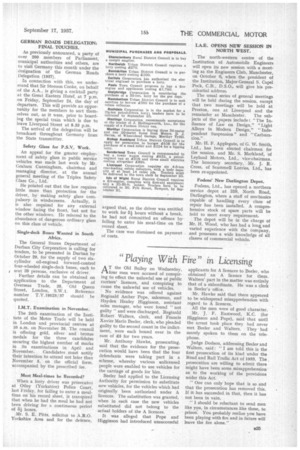" Playing With Fire " in Licensing
Page 35

If you've noticed an error in this article please click here to report it so we can fix it.
A T the Old Bailey on Wednesday, four men were accused of conspiring to effect the unlawful use of public carriers' licences, and conspiring to cause the unlawful use of vehicles.
No evidence was offered against Reginald Archer Pope, salesman, and Hayden Henley Higginson, assistant sales manager, who were found " not guilty "and were discharged. Reginald Robert Walters, clerk. and Francis Xavier Mario Beeler, clerk, who pleaded guilty to the second count in the indictment, were each bound over in the sum of £5 for two years.
Mr. Anthony Hawke, prosecuting, said that the evidence for the prosecution would have been that the four defendants were taking part in a scheme, whereby various unlicensed people were enabled to use vehicles for the carriage of goods for hire.
Beeler had applied to the Licensing Authority for permission to substitute new vehicles, for the vehicles which had originally been authorized under A licences. The substitution was granted, when in each case the new vehicles substituted did not belong to the actual holders of the A licences.
It was alleged that Pope and Higginson had introduced unsuccessful applicants for A licences to Beeler, who obtained an A licence for them. Waiters' part in the matter was entirely that of a subordinate. He was a clerk in Beeler's office.
Mr. Hawke said that there appeared to be widespread misapprehension with regard to A licences.
All the men were of good character.
Mr. J. F. Eastwood, K.C. (for Higginson and Pope), said that until the arrest took place they had never met Beeler and Walters. They had merely spoken to them on the telephone.
Judge Dodson, addressing Beeler and Walters, said : " I am told this is the first prosecution of its kind under the Road and Rail Traffic Act of 1933. The prosecution are willing to admit there might have been some misapprehension as to the working of the provisions under this Act.
" One can only hope that is so and that the prosecution has removed this. If it has succeeded in that, then it has not been in vain.
"I should be reluctant to send men like you, in circumstances like these, to prison. You probably realize you have been playing with fire and in future will leave the fire alone."




















































































